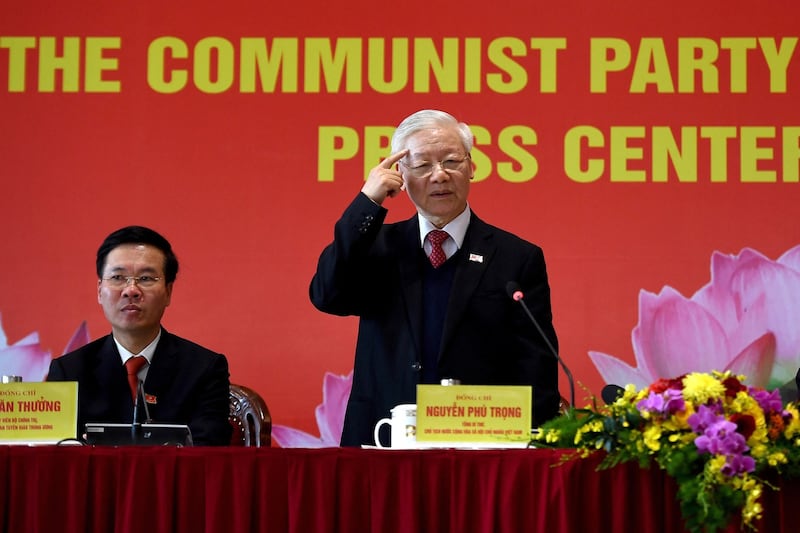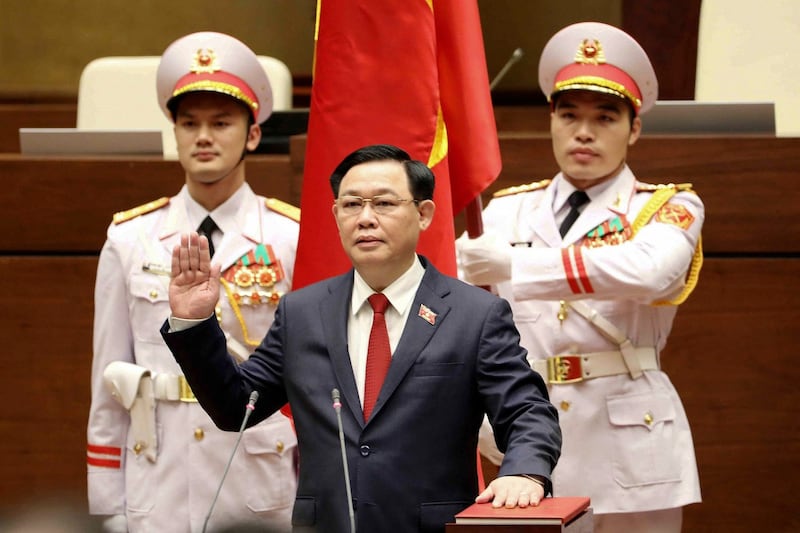The dust seems to have settled on the unprecedented tumult in Vietnam's leadership with the election of Vo Van Thuong as President.
In late December 2022, two deputy prime ministers, Vu Duc Dam and Pham Binh Minh, were forced to resign, the latter also forced off of the Communist Party of Vietnam's elite politburo. Days before Tet, President and former Prime Minister Nguyen Xuan Phuc resigned from the presidency and politburo.
For a regime that likes to present itself as being less authoritarian but as politically stable as China, it’s been a tumultuous few months.
All three were caught up in General Secretary Nguyen Phu Trong's "Blazing Furnace" anti-corruption campaign. Dam and Minh were blamed for pandemic-related scandals in ministries under their watch; though neither was directly implicated. That is arguably less the case with Phuc, who denied any involvement on the part of himself or his family with the Viet A scandal, or other business dealings.
It’s worth asking three questions: First, who is the new president and does his appointment matter? Second, are more heads likely to roll? Third, what does this portend in the run up to the 14th Party Congress slated for January 2026?
Who is Vo Van Thuong?
Vo Van Thuong is the youngest member of the politburo, now in his second term. He’s believed to be a loyalist of General Secretary Nguyen Phu Trong.
Since 2016, Thuong's career has been within the Communist Party of Vietnam's inner echelons, as a top ideologue. He was the head of the central committee's propaganda and education commission and chairman of the Central Council on Political Thought, a top advisory body to ensure government policies are consistent with ideology. He also served on the party secretariat, which is in charge of the party’s day-to-day affairs.
This is why many label him an “apparatchik”. But prior to 2016, his record is far less doctrinaire, when he was a senior official in the party committee of the free-wheeling Ho Chi Minh City.

Thuong’s appointment will have no bearing on Vietnam’s foreign policy, which is constrained by the opposing needs of attracting foreign investment and maintaining the party’s monopoly of power. Foreign policy is set by the central committee and managed by the politburo. The presidency is ceremonial and Thuong has no foreign policy experience.
But for the international business community, he’s a new face. And although Phuc had less power as president than he did as the prime minister, he was a reassuring face to foreign investors and leaders.
While there was speculation that To Lam, the minister of public security could become the president, as he will soon be term limited in that post and may have sought to run it from the presidency as his predecessor did, he could not garner sufficient support.
As it turns out, the guy who runs the secret police and weaponizes corruption investigations turns out to not be the most beloved figure.
Are more heads likely to roll?
Allegations of corruption surrounding Prime Minister Pham Minh Chinh have increased. The rumor mill is in overdrive trying to connect him to Nguyen Thi Thanh Nhan the fugitive former CEO of the Advanced International Joint Stock Company (AIC), who was convicted in January in a $6.3 million fraud case.
But in Vietnam’s opaque media environment, this could simply be fed by Chinh’s rivals.
While possible that he’s forced out, Chinh will likely serve out his term for three reasons: First, the markets would be rattled by any more churn. Already there is real frustration that decision-making in a host of critical sectors, including public health, real estate, banking, and energy is at an absolute standstill. A leadership change would set everything back even further.
Second, there’s a question of who would replace him. There are not a lot of people on the politburo with national-level economic experience.
The head of the National Assembly, Vuong Dinh Hue, has the most, but he’s also one of the two contenders to become the next party general secretary. And given Trong’s age and history of health problems, he’s likely to stay put.

The person to watch is the newly appointed permanent deputy prime minister, Tran Luu Quang. (The "permanent" label means that he can stand in for the prime minister). The recent politburo meeting decided to elevate Quang. Although a rising star, Quang still doesn't have much national level experience, his senior-most role was as the Haiphong party chief. He's in a position to be elevated at the 14th Congress.
Third, Trong has to be concerned about a potential backlash. At the 13th Party Congress in 2021, he couldn’t get his hand-chosen successor Tran Quoc Vuong, who headed the Central Inspection Commission, elected. Vuong posed too great a threat to the rest of the politburo and was unceremoniously dropped from the 13th politburo, which is why Trong stayed on for a third term.
There are hints of push back against Trong who has amassed an unprecedented degree of power now that rivals, such as Nguyen Xuan Phuc, have been ousted and proteges are in positions of power.
That doesn’t mean that heads will not roll below that senior level. 2022 saw an unprecedented number of senior officials, including Central Committee members get prosecuted, reprimanded and/or expelled from the party.
The emergency politburo meeting elected three new members to the Central Inspection Commission, the body responsible for party discipline and counter-corruption investigations. More investigations are expected following the mid-term party congress expected in April.
What does this portend?
The party seeks stability and predictability. Each quinquennial party congress sees one third turnover of its politburo for the sake of continuity.
At present there are only five of 17 members who have served the requisite two terms to become general secretary, but three, Pham Minh Chinh, To Lam and Truong Thi Mai, are less likely candidates.
Mai, for her part, just took over Thuong’s position as the permanent member of the party secretariat, which is a very senior and time-consuming position.

That leaves Vuong Dinh Hue, currently the chairman of the National Assembly but a former minister of finance, and President Vo Van Thuong.
At 52, Thuong is young enough to serve in that position for two terms without an age waiver. His service within the party, rather than government, apparatus is another thing in his favor. Hue is older, now 65, and would require an age waiver were he to become general secretary.
But Thuong does have some liabilities. For one thing though he was born in the Red River Delta, his family is southern, having regrouped in the north following the 1954 division of the country; almost his entire career was in the south and he identifies as a southerner. The general secretary has always been a northerner, but Thuong could be that transitional figure.
The second is the fact that the presidency is usually a “retirement” job, not a stepping stone.
Nguyen Phu Trong, should he not step down beforehand due to poor health, is determined to leave nothing to chance at the 14th Congress. With acolytes Thuong and Hue in place, he’s quietly securing his legacy and ensuring that there won’t be a repeat of the 13th Congress when he could not get his protégé elected.
Zachary Abuza is a professor at the National War College in Washington and an adjunct at Georgetown University. The views expressed here are his own and do not reflect the position of the U.S. Department of Defense, the National War College, Georgetown University or RFA.
